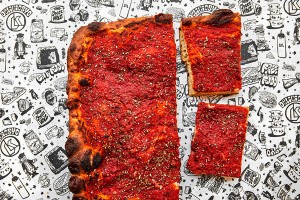Little Black Book: Gratuity Guide
 Dining out in Philadelphia — “America’s best-tipping city,” according to the 2010 Zagat Survey—comes with a lot of responsibility: knowing who to tip, when, and, of course, how much. From waiters to the bathroom attendants, these brief guidelines will, hopefully, help you during those times when a reward for services rendered may be required … and then some.
Dining out in Philadelphia — “America’s best-tipping city,” according to the 2010 Zagat Survey—comes with a lot of responsibility: knowing who to tip, when, and, of course, how much. From waiters to the bathroom attendants, these brief guidelines will, hopefully, help you during those times when a reward for services rendered may be required … and then some.
THE WAITER: 18 to 20 percent of the bill before tax, including wine and beverages.
Generosity seems to be a constant around these parts with an 18 to 20 percent gratuity the norm. Your server surely appreciates this, especially since most waiters are paid only a minimum wage of $2.82 an hour by the restaurant, as mandated by law. Proper tipping takes basic accounting skills and dining savvy. Consider these tips when you’re considering your server’s:
- Create your own mental service review form: This is a personal gauge of positives which will affect what your server can potentially earn ( Add extra if the server addresses you properly (“Mr./Ms. ___”), or provides specialized practices (like serving from the left and clearing from the right/serves ladies first).
- Figure out awkward situations beforehand: you’re dining out with others and some in your group don’t drink alcohol. In this case, have a predetermined understanding which dictates that imbibers are responsible for tipping on their own beverages. This will help to alleviate any potentially embarrassing situations.
- Follow the Commander’s Palace Rule: My wife and I adhere to a dictum we now call “The Commander’s Palace Rule.” It refers to the time when she and I dined with a group of eight friends at that famed New Orleans institution. As the check arrived, we unwittingly let our (tipsy) friend calculate and then collect the table’s gratuity. It wasn’t until we were back in the French Quarter before realizing he had drunkenly overcharged all five couples, leaving the server a mega-generous 40 percent tip! The lesson learned is: Everyone should be given the opportunity to check the bill prior to paying
- What about the buffet?: Buffet dining can be confounding. Should you tip the standard eighteen percent, or less, since you’re the one who’s doing bringing the food to the table? The rule of thumb is tip as you would for regular table service, taking into account the staff’s continual plate clearing and beverage replenishment, and too, they’ve performed the set-up and will break-down the buffet once you’re gone.
- We had terrible service. Now what?: Certainly, 10% is warranted, if not less. Just don’t do the leaving a penny tip thing. That’s not informative, it’s just mean. Stand your ground monetarily, though, and definitely inform the manager about why your service was poor (or fill out a comment card).
THE BARTENDER: The Sky’s the Limit!
There’s a difference between a bartender and your bartender.
With the former, you could tip the standard buck or two per drink, maybe a bit more if there is greater physical activity, or, a skill involved like muddling herbs or blending a frozen drink. The latter means much more to you: part psychologist, marriage counselor and sage; part care giver, guidance counselor and friend, the relationship one form with a favorite bartender transcends any other type of tipped position.
I’ll never get between you and your bartender.
THE COAT CHECKER: $1 per item.
The guideline is simple: Tip one dollar per garment or parcel, or, two if you have an umbrella, and up to five dollars if checking something valuable like a laptop.
THE VALET: $1 to $2 per car.
Pat English, managing partner at Fleming’s Prime Steakhouse & Wine Bar in Radnor offers customers complimentary valet service. He feels it’s proper to leave a dollar or two when it’s time for the parker to retrieve the vehicle.
“There are other factors that may elevate these numbers,” English suggests, “Door openings, umbrella openings, addressing guests by name, these are all reasons why guests might tip more in the range of five dollars.”
What about that nice, shiny car you always see parked right by the entrance? “When a guest wants the valet to leave their car out by the front door, guests usually seem to tip ten or twenty dollars.”
THE FLOOR MANAGER: No gratuity necessary.
There once was a time when I would have entitled this section THE MAITRE D’, but it’s a dying breed—when’s the last time you saw one? The majority of the hosts in restaurants are now considered floor managers (and usually salaried as such), and they are the gatekeepers who can secure or improve your table.
So what should do for them in return? Says English, “Nothing.”
THE RESTROOM ATTENDANT: If you utilize any of the attendant’s accoutrements, or, if you’ve engaged in some nice conversation, then feel free to slip a buck.
You go into the bathroom of a fancy restaurant (or nightclub or casino) and are met by a restroom attendant. Finishing your business, you wash up and are handed a paper towel or two. Your heart beats faster, and a slight wave of nervousness washes over you as you think: “Am I supposed to tip this person for giving me a paper towel?”
Rich Furino, general manager of Del Frisco’s Double Eagle Steakhouse says it’s up to your discretion. In the posh restrooms of his Center City restaurant, Furino employs two lavatorial attaches, Johnny Webb and Dora Clemente, who oversee the men’s and ladies rooms respectively.
Webb operates his “Stall of Fame” (as he calls it), a process beginning with the door being opened for guests. Furino takes us through the rest of the routine: “Johnny will run the water, put soap on the guest’s hands, offer towels…He has high-end colognes, cigarettes, needle and thread, mints, candy and gum, dental floss, it’s service at its highest caliber.”
Furino reports that “Ninety-nine percent of the time, folks will give a dollar. We get more positive feedback about Johnny Webb than any other employee at the restaurant.”
THE CONCIERGE: Optional for exceptional service.
I often get asked if a hotel concierge expects a gratuity for making a restaurant reservation.
With a few exceptions, you should not feel obligated to tip your concierge. After all, this is part of a concierge’s job— securing restaurant reservations. And unlike a waiter who’s making less than minimum wage, most concierges are hourly or salaried employees.
A five to ten dollar gratuity may be offered when the concierge has performed a highly challenging request, like getting you in last-minute at one of the more popular restaurants during prime time, securing the best table in the house, or, arranging for a complimentary appetizer or dessert to be brought to your table. A larger tip ($20) may be given to the concierge that has arranged the truly unforgettable meal, or, created special arrangements like getting an engagement ring to the restaurant and instructions on its timely presentation.
Consider this free advice — no tip required!
Ken Alan is Vice President of Concierge Services for BPG Properties, and he is a founding member of the Philadelphia Concierge Association. His motto is: Nothing is Impossible. Impossible simply takes a few more phone calls.

